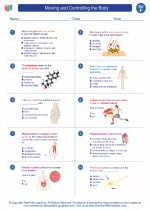Aquatic Ecosystems
An aquatic ecosystem is a community of organisms and the physical environment in which they interact in a watery environment. Aquatic ecosystems can be divided into two main types: freshwater and marine ecosystems.
Freshwater Ecosystems
Freshwater ecosystems include lakes, rivers, streams, and wetlands. These ecosystems are characterized by low salt concentration and are home to a variety of organisms such as fish, amphibians, insects, and plants. Freshwater ecosystems are greatly affected by human activities such as pollution, dam construction, and water extraction.
Marine Ecosystems
Marine ecosystems encompass oceans, coral reefs, estuaries, and coastal areas. These ecosystems have high salt concentration and are home to diverse marine life including fish, mammals, invertebrates, and algae. Marine ecosystems play a crucial role in regulating the Earth's climate and providing essential resources for humans.
Key Concepts to Study
- Abiotic and Biotic Factors: Understand the interactions between the non-living (abiotic) and living (biotic) components of aquatic ecosystems.
- Food Chains and Food Webs: Learn about the flow of energy and nutrients through aquatic ecosystems and how organisms are interconnected.
- Adaptations: Explore the unique adaptations of aquatic organisms to their watery environments, such as gills for breathing and streamlined bodies for swimming.
- Human Impact: Investigate the ways in which human activities impact aquatic ecosystems, including pollution, overfishing, and habitat destruction.
- Conservation: Examine the importance of conserving aquatic ecosystems and the measures that can be taken to protect and restore these vital environments.
Study Tips
Here are some tips to help you study the topic of aquatic ecosystems:
- Use visual aids such as diagrams, charts, and videos to understand the complex relationships within aquatic ecosystems.
- Take field trips to local bodies of water or aquariums to observe aquatic organisms in their natural habitats.
- Review case studies of successful conservation efforts and the impact of human activities on aquatic ecosystems.
- Practice identifying different species of aquatic organisms and their roles within the ecosystem.
- Engage in discussions about the ethical implications of human intervention in aquatic ecosystems and the responsibilities of conservation.
Hopefully, this study guide helps you to understand the important concepts related to aquatic ecosystems. Good luck with your studies!
[Aquatic] Related Worksheets and Study Guides:
.◂Science Worksheets and Study Guides Sixth Grade. Moving and Controlling the Body

 Worksheet/Answer key
Worksheet/Answer key
 Worksheet/Answer key
Worksheet/Answer key
 Vocabulary/Answer key
Vocabulary/Answer key
 Vocabulary/Answer key
Vocabulary/Answer key
 Vocabulary/Answer key
Vocabulary/Answer key
